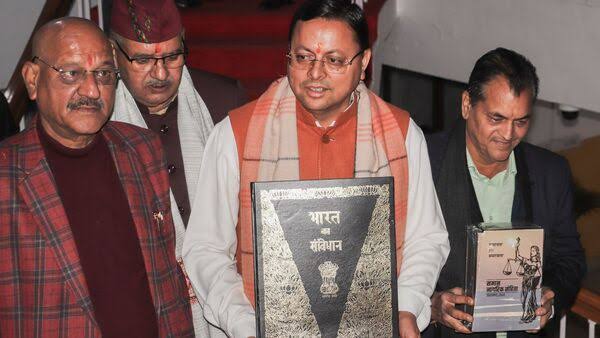
Uttarakhand has made history by passing the Uniform Civil Code (UCC) Bill during its recent assembly session, becoming the pioneer state in India to implement such legislation. The bill, a promise made by the BJP during the 2022 assembly elections, signifies a significant step towards standardizing laws related to marriage, divorce, property, and inheritance for all citizens, regardless of their religion.
A Landmark Moment for Uttarakhand
In a momentous move, the UCC Bill was passed through a voice vote after thorough discussions in the assembly session. Chief Minister Pushkar Singh Dhami, expressing his enthusiasm, declared that the vision of the Constitution’s framers was now turning into a reality. Uttarakhand is set to create history, urging other states to follow suit.
The Legislative Process: From Assembly to Implementation of Uniform Civil Code (UCC)
The UCC Bill, having successfully passed the assembly, is now slated to be sent to the Governor for approval. Once signed, it will swiftly become law, applying uniform regulations to the entire population of Uttarakhand. Notably, the provisions of the bill exempt Scheduled Tribe (ST) individuals.
Promised and Delivered: BJP’s Commitment to UCC
The enforcement of the UCC in Uttarakhand was a commitment made by the BJP during the 2022 elections. Following the formation of CM Dhami’s government, a committee was established to draft the UCC. The committee meticulously considered over 2.5 lakh suggestions, resulting in Uttarakhand emerging as the first state to implement the UCC.
Key Provisions of the UCC Bill: A Step Towards Equality
1. Equal Property Rights for Sons and Daughters
The UCC ensures equal property rights for both sons and daughters, irrespective of their category. This provision aims to eliminate gender-based disparities in property inheritance.
2. Elimination of Distinctions for Illegitimate Children
The bill removes the distinction between legitimate and illegitimate children concerning property rights. Children born out of wedlock are granted equal property rights, recognizing them as biological children.
3. Equality for Adopted Children
The UCC treats children born through adoption, surrogacy, or assisted reproductive technology equally, providing them with the same rights as biological children.
4. Equal Property Rights After Death
In a departure from previous laws, the UCC ensures equal property rights for spouses, children, and parents of the deceased.
Further Objectives of the UCC: Standardizing Legal Structures
Apart from addressing property rights, the UCC aims to establish a consistent legal structure for marriage, divorce, land, property, and inheritance laws for all citizens, irrespective of their religious beliefs. Recommendations from the drafting committee also include advocating for a complete ban on polygamy and child marriage, as well as enforcing a uniform marriageable age for girls across religions.
Paving the Way for Legal Consistency
Uttarakhand’s groundbreaking step towards implementing the Uniform Civil Code sets a precedent for legal consistency in the country. The bill, once signed into law by the Governor, will bring about a significant transformation in the legal landscape of the state, fostering equality and standardization across various aspects of civil life. As the nation watches, Uttarakhand becomes a trailblazer in the journey towards a uniform legal framework for all its citizens.**






